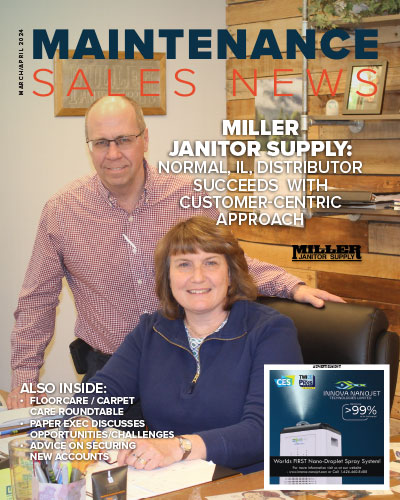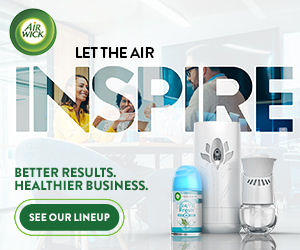Executives Discuss The Proper Use And Importance Of Disinfectants & Sanitizers
By Harrell Kerkhoff, Maintenance Sales News Editor
Although the threat of COVID-19 has diminished, the recent pandemic was a “good” reminder that pathogen control is a never-ending process. Therefore, proper utilization of disinfectants and sanitizers remains essential for facility care and occupant safety within the wide away-from-home landscape. Properly using such products, however, requires specialized knowledge and training.
Maintenance Sales News Magazine recently interviewed company representatives from well-known disinfectant and/or sanitizer producers to learn more about the products, their proper usage, and current demand within the cleaning industry.
The Bullen Companies
The world has gained a greater understanding on the importance of proper training and education related to pathogen control, since the start of the pandemic. It is nonetheless critical that this training/education continue. Training is key to future results, according to The Bullen Companies President Scott Jarden.
“Most people still do not know the difference between a disinfectant and a sanitizer. They see that a product states it kills 99.9 percent of germs and figure that is good enough,” Jarden said. “However, if they don’t know the difference, the task at hand may be done incorrectly. That is why it’s important to return to training — it’s essential to future results.
“Also, due to today’s difficulty in finding enough people for housekeeping and other cleaning tasks, the need is always there for additional training. That includes learning about the proper use of the right products designed for pathogen control — as well as the goals associated with such efforts.”
For example, people who clean must understand “dwell time,” which is the amount of time a disinfectant must remain visibly wet on a surface to effectively kill a specific pathogen.
“The best thing that Bullen and other manufacturers and distributors can do is offer end-users a review of their current practices and procedures. We are known for our consultative support and provide training videos and brochures for almost all our products. Information includes kill claims and how each item should be properly used. It’s important to work with supplier representatives who can answer questions from distributors and end-users, as well as provide hands-on-help involving a variety of issues.”
He added it’s important to get “back to the basics” when it comes to the proper application of disinfectants and sanitizers.
“Instead of disinfecting ‘every surface you can think of,’ which was taking placing by many people during the pandemic, the real focus should now be on high-touch surfaces and floors,” Jarden said. “It’s also important to achieve the proper dwell time on surfaces, which is proven to control pathogens.”
He noted the supply chain involving raw materials and packaging, associated with disinfectants and sanitizers, has stabilized within the past six to eight months. He also said there remains plenty of inventory in place, causing demand to be slow.
“Demand is coming back, but there is still a lot of inventory out there,” Jarden explained.
The Bullen Companies is known as a manufacturer that provides high-quality cleaning and odor control products. This includes a variety of chemical cleaners, deodorants, disinfectants, and similar products, often used by professional cleaning services. These products are used across different industries such as janitorial, industrial, aviation, and more. Bullen has its own brands, Airx, Truekleenn, One Up, Clausen Carpet Solutions and E-Clean environmentally preferable cleaning products. It also makes thousands of specialty products from dog shampoo to aircraft cleaners. For more information about Bullen, send an email to sales@bullenonline.com or visit www.bullenonline.com.
Spartan Chemical
It’s important to remember there is no “silver bullet” when it comes to infectious disease control. Each situation is unique, explained Spartan Chemical Vice President of Marketing and Advertising Cali Sartor.
“You must consider a specific environment and the severity of what you may be looking to control and assess, based on certain factors. Then, you can put together an infection prevention program using a variety of products, staff training, and program maintenance management tools,” Sartor said. “Individual needs vary because they’re entirely dependent on each situation. Lately, we are seeing a renewed interest in quat-alternative disinfectants, like peroxide or alcohol-based products. But the main ‘need’ is still a neutral disinfectant for daily routine maintenance. We continue to see demand for, and use of, neutral disinfectants, which are products with a neutral pH and safe for daily use. We also continue to see demand for concentrated products, primarily due to these being the more economical choice for facilities and their needs. With all professional-use products, cleaning staff members must refer to the product label to guide proper use.”
When asked to specify the most common areas — within an average away-from-home facility — that require the most use of disinfectants and/or sanitizers, Sartor responded that it varies based on each individual facility. A special focus, however, should be placed on high-traffic areas.
“A concentrated, neutral, one-step disinfectant cleaner product is both economical and safe to use on most of these frequently cleaned surfaces. But as always, it’s important to check the product label for surface compatibility,” she explained. “We also recommend those in charge of cleaning to refer to the EPA’s guidance on the difference between a ‘disinfectant,’ a ‘sanitizer’ and a ‘cleaner.’ Those definitions are very specific.”
Sartor also recommended the use of web-based learning systems that can demonstrate proper procedures and can often allow users to be certified as disinfection specialists. Software is also available to help managers keep facilities on track with cleaning procedures and schedules, and ensure proper cleaning is done on time and efficiently.
“Those types of programs can really make a difference in an infection prevention program,” she said.
As for the availability of disinfectants and sanitizers within the North American marketplace, Sartor explained that certain raw materials the industry needed most, during the pandemic, did become much more difficult to secure due to supply chain shortages. That obviously impacted the availability of many products for a period. Fortunately, the situation has improved.
“The supply chain has since recovered, and from our perspective, things are back to pre-pandemic levels of availability,” she said.
At Spartan Chemical Company, we make clean simple®. Family owned and operated since 1956, Spartan Chemical is a leading manufacturer of superior and cost-effective specialty chemical products sold through select, trusted distributors. Developed through conservative, stringent, and environmentally responsible practices with a focus on innovation, Spartan products include industrial cleaners, disinfectants, wipes, skin care, food processing, laundry care, warewash, floor care and vehicle wash products. In addition to cleaning products, Spartan offers CleanCheck® learning management system and CompuClean® facility management software to ensure the safety of staff and optimal efficiency of facility operations. From tools to training, Spartan’s solutions ensure consistently clean, healthy, and safe environments for building occupants and cleaning staff in education, health care, food processing, hospitality, and public facilities. Learn more at www.spartanchemical.com.
Kutol Products
Along with properly disinfecting and sanitizing high-touch surfaces and floors within facilities, keeping hands free of harmful germs is another key element to pathogen control. The importance of proper hand hygiene didn’t stop with the end of the pandemic — it’s still critically important in halting the spread of germs, noted Kutol Products Vice President of Sales and Marketing Brandon Jones.
He added that jan/san distributors can position themselves as experts in guiding hand care decisions for their customers.
“It’s important to ask: Are there placements within the facility where hand sanitizer should be available? Is the facility well stocked with product to match expected usage? Simple actions such as making sanitizer more readily available — especially in high-traffic areas — can have a great impact on the health of a facility,” Jones said. “Facilities today must prioritize the health and wellness of their environment, staff, visitors and customers. That includes controlling the spread of pathogens and germs, which is a crucial need. There is also a need for ease-of-use and maintenance. Labor shortages within the janitorial and custodial sector mean facilities have less time and resources to do more. Sanitizer dispensers, for example, must be easy to install, use, refill and maintain.
“High-traffic areas, and locations where people gather, are most in need of hand sanitizer. Entrances, exits, lobbies, hallways and lunch and locker rooms are good examples. Soap and sanitizer are among the first lines of defense against the spread of germs in a facility, so ensuring those products are available and well-stocked is key. The expectation of end-users today involves quick, easy, and constant access to sanitizer throughout a facility.”
To effectively sanitize hands, it’s important to start with enough product to cover all surfaces of the hands, which is about a palmful of sanitizer, according to Jones. Rub sanitizer thoroughly on both sides of hands, including palms, fingers, around fingertips and fingernails, and between fingers and thumbs. Similar to hand washing, this should take about 20 seconds.
“It’s also important to allow hand sanitizer to dry. The CDC recommends NOT rinsing or wiping off hand sanitizer before it dries, in order to achieve maximum effectiveness against germs,” he said.
It was also reported by Jones that more end-users and facilities continue to place greater emphasis on sustainable, eco-friendly sanitizer options.
“Green Seal® certified and USDA BioPreferred™ products are ideal to fill that need. Facilities are also interested in fragrance- and dye-free products as they appeal to a wider audience and eliminate potential allergy issues,” Jones said. “There are also cost savings when choosing foam sanitizer products. Foam hand sanitizer is thick and stays on hands; it’s easier to ration foaming hand sanitizer because it feels like the person is using more product; and, refills last longer with foam, requiring less labor to keep dispensers well stocked and functioning.”
As for the current supply situation, Jones said demand continues to increase as more facilities run through sanitizer inventory that was purchased during the pandemic, or have product that is expiring.
“Sanitizer availability is good and for the most part, back to pre-pandemic levels,” he explained. “When purchasing sanitizer, consumers should still pay attention to who the manufacturers are, and where they are located. Avoid manufacturers on the FDA’s ‘Do Not Use’ list. Choosing sanitizers made in the USA means FDA requirements have been met.”
Kutol Products manufactures high-quality skin care products for the away-from-home market. In operation for more than 100 years, Kutol’s hand soaps, sanitizers and dispensers can be found across the U.S. and Canada in schools, restaurants, airports, hospitals and office buildings as well as industrial and manufacturing facilities. Health Guard® is Kutol’s general purpose hand care line including Green Seal® certified and USDA BioPreferred™ soaps and sanitizers. Kutol® Pro is the company’s industrial, heavy-duty option offering scrubs, creams, and wipes. Products are manufactured in Kutol’s LEED Silver Certified, FDA registered facility in Cincinnati, OH. Additionally, the company offers expertise in private label and contract soap manufacturing with a focus on quality. Visit www.kutol.com.







